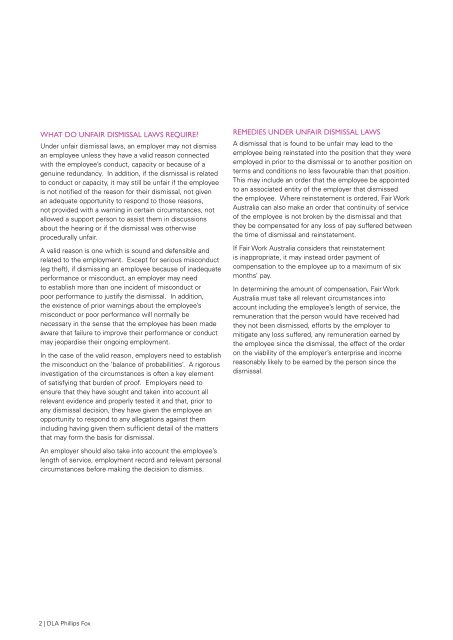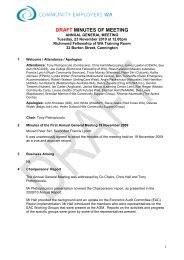TERMINATION OF EMPLOYMENT
TERMINATION OF EMPLOYMENT - Community Employers WA
TERMINATION OF EMPLOYMENT - Community Employers WA
- No tags were found...
You also want an ePaper? Increase the reach of your titles
YUMPU automatically turns print PDFs into web optimized ePapers that Google loves.
What do unfair dismissal laws require?Under unfair dismissal laws, an employer may not dismissan employee unless they have a valid reason connectedwith the employee’s conduct, capacity or because of agenuine redundancy. In addition, if the dismissal is relatedto conduct or capacity, it may still be unfair if the employeeis not notified of the reason for their dismissal, not givenan adequate opportunity to respond to those reasons,not provided with a warning in certain circumstances, notallowed a support person to assist them in discussionsabout the hearing or if the dismissal was otherwiseprocedurally unfair.A valid reason is one which is sound and defensible andrelated to the employment. Except for serious misconduct(eg theft), if dismissing an employee because of inadequateperformance or misconduct, an employer may needto establish more than one incident of misconduct orpoor performance to justify the dismissal. In addition,the existence of prior warnings about the employee’smisconduct or poor performance will normally benecessary in the sense that the employee has been madeaware that failure to improve their performance or conductmay jeopardise their ongoing employment.In the case of the valid reason, employers need to establishthe misconduct on the ‘balance of probabilities’. A rigorousinvestigation of the circumstances is often a key elementof satisfying that burden of proof. Employers need toensure that they have sought and taken into account allrelevant evidence and properly tested it and that, prior toany dismissal decision, they have given the employee anopportunity to respond to any allegations against themincluding having given them sufficient detail of the mattersthat may form the basis for dismissal.Remedies under unfair dismissal lawsA dismissal that is found to be unfair may lead to theemployee being reinstated into the position that they wereemployed in prior to the dismissal or to another position onterms and conditions no less favourable than that position.This may include an order that the employee be appointedto an associated entity of the employer that dismissedthe employee. Where reinstatement is ordered, Fair WorkAustralia can also make an order that continuity of serviceof the employee is not broken by the dismissal and thatthey be compensated for any loss of pay suffered betweenthe time of dismissal and reinstatement.If Fair Work Australia considers that reinstatementis inappropriate, it may instead order payment ofcompensation to the employee up to a maximum of sixmonths’ pay.In determining the amount of compensation, Fair WorkAustralia must take all relevant circumstances intoaccount including the employee’s length of service, theremuneration that the person would have received hadthey not been dismissed, efforts by the employer tomitigate any loss suffered, any remuneration earned bythe employee since the dismissal, the effect of the orderon the viability of the employer’s enterprise and incomereasonably likely to be earned by the person since thedismissal.An employer should also take into account the employee’slength of service, employment record and relevant personalcircumstances before making the decision to dismiss.2 | DLA Phillips Fox






